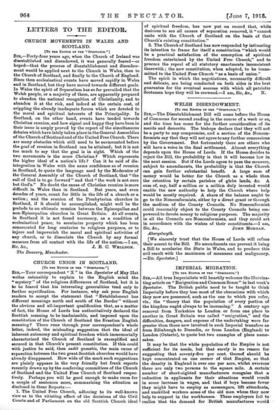LETTERS TO THE EDITOR.
CHURCH MOVEMENTS IN WALES AND SCOTLAND.
[To THE EDITOR OP THE " SPECTATOR."] STE, —Forty-four years ago, when the Church of Ireland was disestablished and disendowed, it was generally feared—or hoped—that the process of disestablishment and disendow- ment would be applied next to the Church in Wales, then to the Church of Scotland, and finally to the Church of England. Since then ecclesiastical events have moved rapidly in Wales and in Scotland, but they have moved towards different goals. In Wales the spirit of Separatism has so far prevailed that the Welsh people, or a majority of them, are apparently prepared to abandon the national recognition of Christianity, and to abandon it at the risk, and indeed at the certain cost, of crippling the already inadequate forces which are devoted to the moral and spiritual interests of the Principality. In
Scotland, on the other hand, events have tended towards
Christian reunion, and how signal and happy they have been in their issue is amply proved by the report of the simultaneous debates which have lately taken place in the General Assemblies of the Church of Scotland and of the United Free Church. There are many obstacles which still need to be surmounted before the goal of reunion in Scotland can be attained; but it is not too much to say that the goal is in sight. Which of the two movements is the more Christian P Which represents the higher ideal of a nation's life ? Can it be said of dis- integration in Wales with the same confidence as of reunion in Scotland, to quote the language used by the Moderator of the General Assembly of the Church of Scotland, that " the call of God is to go forward" and that " the work is not ours but God's." No doubt the cause of Christian reunion is more difficult in Wales than in Scotland. But years, and even decades of years, count for little in the life of a church or a nation ; and the reunion of the Presbyterian churches in Scotland, if it should be accomplished, might well be the prelude to an ultimate reunion between the Episcopalian and non-Episcopalian churches in Great Britain. At all events, in Scotland it is not found necessary, as a condition of ecclesiastical peace, to secularize property which has been consecrated for long centuries to religious purposes, or to injure and impoverish the moral and spiritual activities of any church, or to dissociate the Church by any formal measure from all contact with the life of the nation.—I am,














































 Previous page
Previous page